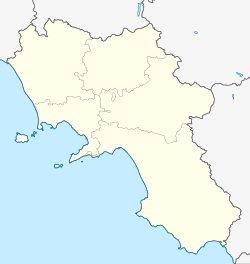San Sebastiano al Vesuvio | |
|---|---|
| Comune di San Sebastiano al Vesuvio | |
 | |
| Coordinates: 40°50′N14°22′E / 40.833°N 14.367°E | |
| Country | Italy |
| Region | Campania |
| Metropolitan city | Naples (NA) |
| Government | |
| • Mayor | Giuseppe Panico (since 2021) [1] |
| Area | |
• Total | 2 km2 (0.77 sq mi) |
| Elevation | 175 m (574 ft) |
| Population (2024) [3] | |
• Total | 8,626 |
| • Density | 4,300/km2 (11,000/sq mi) |
| Demonym | Sansebastianesi or Sebastianesi |
| Time zone | UTC+1 (CET) |
| • Summer (DST) | UTC+2 (CEST) |
| Postal code | 80040 |
| Dialing code | 081 |
San Sebastiano al Vesuvio (Neapolitan : San Bastiano) is a comune (municipality) in the Metropolitan City of Naples, located on the western slopes of Mount Vesuvius. Its elevation means that it is often a few degrees cooler than the neighbouring metropolis of Naples.

In 1944 it was destroyed and two children were killed by the eruption of Mount Vesuvius during the Allies' occupation of southern Italy, but has since been rebuilt. [4] [5] The main attraction is the church of San Sebastiano Martire from the 16th century.
Gaetano Filangieri, a Neapolitan jurist, was born in San Sebastiano al Vesuvius. He had an extensive correspondence with Benjamin Franklin.


